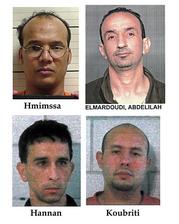Sep 1, 10:59 AM EDT
U.S. Seeks to Dismiss Terror Convictions
By JOHN SOLOMON and CURT ANDERSON
Associated Press Writers
WASHINGTON (AP) -- In a dramatic reversal, the Justice Department
acknowledges its original prosecution of a suspected terror cell in Detroit was
filled with a "pattern of mistakes and oversights" that warrant the
dismissal of the convictions.
In a 60-page memo that harshly criticizes its own prosecutors' work, the
department told U.S. District Judge Gerald Rosen on Tuesday night it supports
the Detroit defendants' request for a new trial and would no longer pursue
terrorism charges against them. The defendants at most would only face fraud
charges at a new trial.
The Justice Department is "concurring in the defendants' motions for a
new trial" and asks the court to dismiss the first count of the original
indictment charging the defendants with material support of terrorism, the
government's filing said.
The reversal comes during the buildup to President Bush's nomination
acceptance speech at the Republican National Convention, where he and his allies
have been touting their success in the war on terror.
The department's decision came after a monthslong internal investigation
uncovered several pieces of evidence that prosecutors failed to turn over to
defense lawyers before the trial last year. The probe exposed deep differences
within the government over the course of the case and the quality of the
prosecution's evidence.
The internal investigation of prosecutorial misconduct found enough problems
that there is "no reasonable prospect of winning," the government
conceded, drawing back from a case once hailed by the Bush administration as a
major victory in the war on terror.
"In its best light, the record would show that the prosecution committed
a pattern of mistakes and oversights that deprived the defendants of
discoverable evidence (including impeachment material) and created a record
filled with misleading inferences that such material did not exist,"
Justice told the court.
The decision was hailed by lawyers for the Detroit men who were convicted
last year.
"We're extremely grateful," William Swor, lawyer for defendant
Abdel-Ilah Elmardoudi, said Wednesday. "It's a major victory."
Swor said the dropping of the terrorism charges leaves the government with
"a garden-variety document case" against his client. "Our work is
just beginning," he said.
The memo attached to Justice's filing was harshly critical of Assistant U.S.
Attorney Richard Convertino, the lead prosecutor in the case. It quotes
Convertino's colleague who worked on the case as saying he would never have
proceeded if he knew the problems uncovered by the internal investigation.
For instance, Justice alleged that Convertino was told about photos of a
Jordanian hospital that the alleged Detroit cell was accused of making
surveillance sketches of, but never introduced the photos at trial or told
defense lawyers. Instead, the prosecution elicited testimony from an FBI agent
suggesting there were no such photos.
"Misleading testimony was elicited that created the false impression
that there was initial consensus that the drawing depicted the Queen Alia
Hospital and that photos could not be taken due to diplomatic red tape,"
Justice conceded.
Convertino has been under investigation for months and filed a whistle-blower
lawsuit against Attorney General John Ashcroft earlier this year. In an
interview with the AP, Convertino accused Justice Department superiors of
thwarting his efforts to introduce some evidence against the defendants at
trial.
Convertino's lawyer, William Sullivan, declined comment Tuesday night, citing
the judge's gag order.
In the new court papers, the Justice Department also divulged testimony from
a recently retired CIA officer who directly called into question another of the
government's key conclusions at trial - that the alleged Detroit terror cell had
made a surveillance sketch of a Turkish air base used by American fighter jets.
The retired CIA officer, William McNair, told the Justice Department he told
Convertino during five to 10 conversations that CIA experts "did not
believe the sketch conveyed any useful information" and was probably
created by "someone who was not very well-trained."
The filing also noted that the government uncovered new evidence, recently
reported by the AP, that FBI agents in Las Vegas and Detroit disagreed over
whether a videotape found in the Detroit terror cell's apartment was
surveillance footage of American landmarks, as jurors were told.
And a Tunisian man who appeared in the videotape of landmarks in New York,
Las Vegas and California has told investigators the tape was amateur footage
from a university student trip, not surveillance as prosecutors claimed.
The government said its review also turned up more evidence calling into
question the testimony of a key witness. Youssef Hmimssa, a self-described scam
artist who lived briefly with some of the defendants, testified that they were
extremists who wanted to support attacks against the United States.
Justice said it found evidence supporting the defense's claim that Hmimssa's
testimony "evolved over time" during his cooperation with prosecutors.
Three versions of typed notes of interviews with Hmimssa by Convertino showed
"limited but not inconsequential discrepancies," it said.
Doubts have circulated about Hmimssa since December, when the government came
forward with a letter from an imprisoned drug gang leader, who said Hmimssa
bragged to him that he had made up some of his story about the defendants to
fool the FBI.
In a June 2003 jury verdict hailed by the administration as the breakup of a
terror cell, Koubriti, 26, and Elmardoudi, 38, were convicted on terrorism and
fraud charges and Ahmed Hannan, 36, was convicted of fraud. A fourth defendant,
Farouk Ali-Haimoud, 24, was acquitted.
© 2004 The Associated Press. All rights reserved. This material may not be
published, broadcast, rewritten or redistributed.
Source
